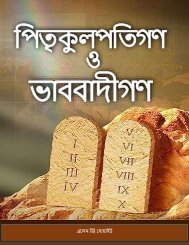Finishing the Race
Of all the games instituted among the Greeks and the Romans, the races were the most ancient and the most highly esteemed … The contests were governed by strict regulations, from which there was no appeal. Those who desired their names entered as competitors for the prize had first to undergo a severe preparatory training. Harmful indulgence of appetite, or any other gratification that would lower mental or physical vigour, was strictly forbidden. For one to have any hope of success in these trials of strength and speed, the muscles must be strong and supple, and the nerves well under control. Every movement must be certain, every step swift and unswerving; the physical powers must reach the highest mark.
Of all the games instituted among the Greeks and the Romans, the races were the most ancient and the most highly esteemed … The contests were governed by strict regulations, from which there was no appeal. Those who desired their names entered as competitors for the prize had first to undergo a severe preparatory training. Harmful indulgence of appetite, or any other gratification that would lower mental or physical vigour, was strictly forbidden. For one to have any hope of success in these trials of strength and speed, the muscles must be strong and supple, and the nerves well under control. Every movement must be certain, every step swift and unswerving; the physical powers must reach the highest mark.
You also want an ePaper? Increase the reach of your titles
YUMPU automatically turns print PDFs into web optimized ePapers that Google loves.
faith. He soon after witnessed in a neighbouring village <strong>the</strong> beheading of a man who was put<br />
to death for having been rebaptised. This led him to study <strong>the</strong> Bible in regard to infant<br />
baptism. He could find no evidence for it in <strong>the</strong> Scriptures, but saw that repentance and faith<br />
are everywhere required as <strong>the</strong> condition of receiving baptism.<br />
Menno withdrew from <strong>the</strong> Roman Church and devoted his life to teaching <strong>the</strong> truths<br />
which he had received. In both Germany and <strong>the</strong> Ne<strong>the</strong>rlands a class of fanatics had risen,<br />
advocating absurd and seditious doctrines, outraging order and decency, and proceeding to<br />
violence and insurrection. Menno saw <strong>the</strong> horrible results to which <strong>the</strong>se movements would<br />
inevitably lead, and he strenuously opposed <strong>the</strong> erroneous teachings and wild schemes of <strong>the</strong><br />
fanatics. There were many, however, who had been misled by <strong>the</strong>se fanatics, but who had<br />
renounced <strong>the</strong>ir pernicious doctrines; and <strong>the</strong>re were still remaining many descendants of<br />
<strong>the</strong> ancient Christians, <strong>the</strong> fruits of <strong>the</strong> Waldensian teaching. Among <strong>the</strong>se classes Menno<br />
laboured with great zeal and success.<br />
For twenty-five years he travelled, with his wife and children, enduring great hardships<br />
and privations, and frequently in peril of his life. He traversed <strong>the</strong> Ne<strong>the</strong>rlands and nor<strong>the</strong>rn<br />
Germany, labouring chiefly among <strong>the</strong> humbler classes but exerting a widespread influence.<br />
Naturally eloquent, though possessing a limited education, he was a man of unwavering<br />
integrity, of humble spirit and gentle manners, and of sincere and earnest piety,<br />
exemplifying in his own life <strong>the</strong> precepts which he taught, and he commanded <strong>the</strong><br />
confidence of <strong>the</strong> people. His followers were scattered and oppressed. They suffered greatly<br />
from being confounded with <strong>the</strong> fanatical Munsterites. Yet great numbers were converted<br />
under his labours.<br />
Nowhere were <strong>the</strong> reformed doctrines more generally received than in <strong>the</strong> Ne<strong>the</strong>rlands.<br />
In few countries did <strong>the</strong>ir adherents endure more terrible persecution. In Germany Charles V<br />
had banned <strong>the</strong> Reformation, and he would gladly have brought all its adherents to <strong>the</strong> stake;<br />
but <strong>the</strong> princes stood up as a barrier against his tyranny. In <strong>the</strong> Ne<strong>the</strong>rlands his power was<br />
greater, and persecuting edicts followed each o<strong>the</strong>r in quick succession. To read <strong>the</strong> Bible,<br />
to hear or preach it, or even to speak concerning it, was to incur <strong>the</strong> penalty of death by <strong>the</strong><br />
stake. To pray to God in secret, to refrain from bowing to an image, or to sing a psalm, was<br />
also punishable with death. Even those who should abjure <strong>the</strong>ir errors were condemned, if<br />
men, to die by <strong>the</strong> sword; if women, to be buried alive. Thousands perished under <strong>the</strong> reign<br />
of Charles and of Philip II.<br />
At one time a whole family was brought before <strong>the</strong> inquisitors, charged with remaining<br />
away from mass and worshiping at home. On his examination as to <strong>the</strong>ir practices in secret<br />
<strong>the</strong> youngest son answered: "We fall on our knees, and pray that God may enlighten our<br />
minds and pardon our sins; we pray for our sovereign, that his reign may be prosperous and<br />
his life happy; we pray for our magistrates, that God may preserve <strong>the</strong>m."--Wylie, b. 18, ch.<br />
6. Some of <strong>the</strong> judges were deeply moved, yet <strong>the</strong> fa<strong>the</strong>r and one of his sons were<br />
condemned to <strong>the</strong> stake.<br />
145


















